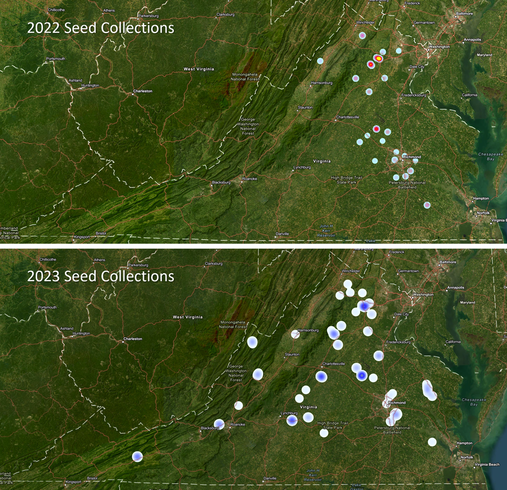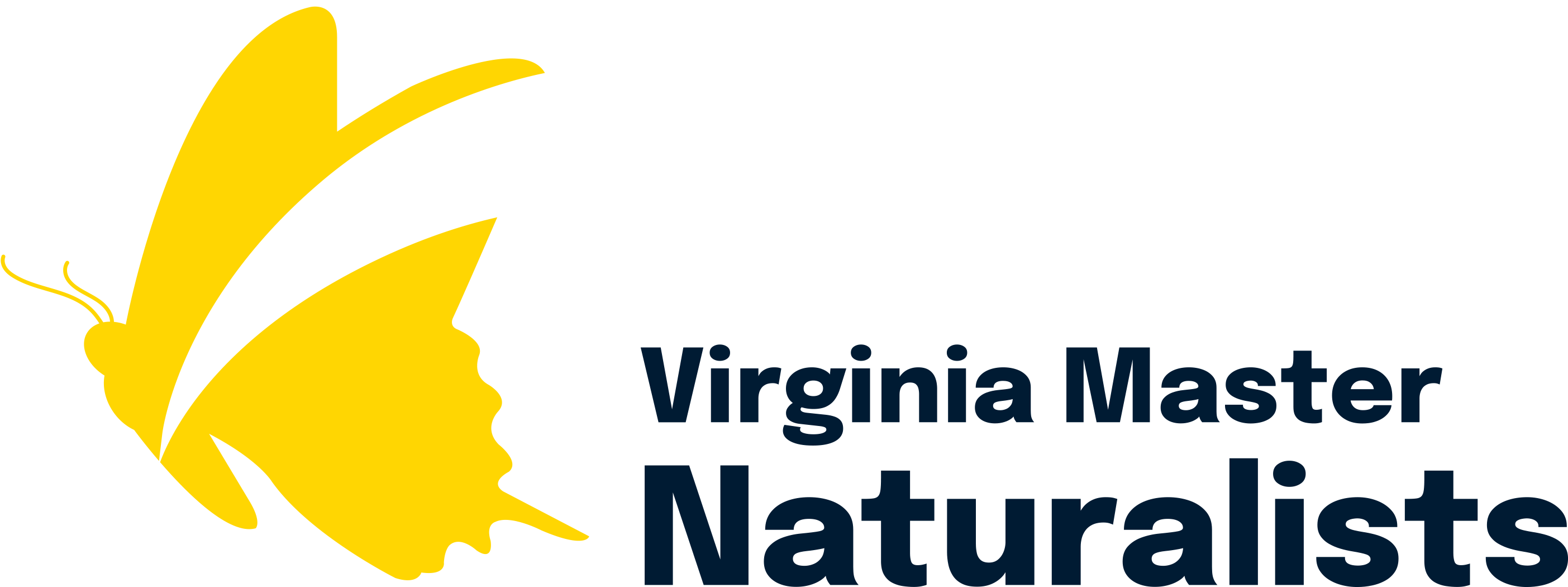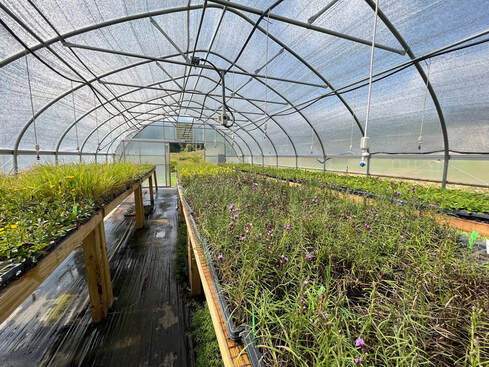 Map of 2023 seed collections compared to 2022 collections. With the help of VMN Volunteers, seed collection expanded, particularly in the mountain area of the state. Image by Isaac Matlock.
Map of 2023 seed collections compared to 2022 collections. With the help of VMN Volunteers, seed collection expanded, particularly in the mountain area of the state. Image by Isaac Matlock.
2023 Virginia Native Seed Pilot Project Summary
By Isaac Matlock, Virginia Native Seed Project Coordinator, the Clifton Institute
Accomplishments
1. Recruited six farms to establish seed harvesting operations
2. Constructed new greenhouse at Clifton for plug production
3. Produced plants needed for all operations including Clifton’s and Virginia State University’s
4. Seed harvest plots established at Clifton and VSU
5. Collected seeds for all eighteen project species
6. Increased genetic diversity in seeds collected with assistance of the Virginia Master Naturalists
7. All seed harvest plots were established and planted by the fall
8. First partial seed harvested and sent to Ernst Conservation Seed for evaluation
Seed Increase Operations and Plug Production
We were able to produce a surplus of plants for the project in the first year thanks to the construction of the greenhouse at Clifton and the huge effort from Ernst Conservation Seeds. All participating farms and the demonstration plots at Clifton and VSU were planted on schedule by the fall. The farmers will be working to establish commercial size operations but the demonstration plots at Clifton and VSU can serve multiple purposes. We hope the seed increase plots at Clifton can provide an additional source of local ecotype plant material but also serve as an educational tool for anyone interested in starting their own native seed increase operations. There are many seed increase projects occurring around the United States, so it’s exciting to see Virginia catch up and join the ranks.
A common question we get asked is why we are installing live plants rather than sowing seed in fields to establish our plots. There are two primary reasons for that: Firstly, we increase the chances of producing seed in less time by planting plugs rather than sowing seed. There is no guarantee that drilling the seeds will result in a successful stand and it could take multiple years to produce seeds that way. Secondly, we reduce the competition with weeds by planting mature plants. It still takes thousands of plugs to plant a single acre, so as these operations grow we will need to establish reliable means for them to source the appropriate ecotype plant material. With our single greenhouse at Clifton, we have the ability to produce up to 33,000 plugs which I hope can be a vital resource getting Virginia ecotype seeds on the commercial market.
We made significant progress in 2023, which was the first full year of the Virginia Native Seed Pilot Project. Although we did not end up with as many farm operations on the project as desired, I believe that with time and proven success in the operations we will see more interest from others to join. Our current farmers are spread out through five different counties and are extremely diverse in their type of land use and experience. Each one has a unique approach to how to implement a native seed harvesting operation and their ingenuity has contributed greatly to the success of the project so far.
We provide farmers with baseline recommendations for establishing a seed harvesting operation, but there is a lot of room for improvisation. It can be a big commitment to add a crop to a system that farmers have no prior experience with and I have a lot of respect for all of our participants and their willingness to jump into something new. With the efforts made by our farmers, we have seen a small harvest a year ahead of schedule! These seeds can serve as a foundation for additional live plants to increase their operations, and will give us valuable information on the type of yield they should expect going forward.
Wild Seed Collection Update
It was challenging to know what to expect for our wild seed collections this year as we were trying to collect from all new areas compared to 2022 in order to give those populations a rest year. This made things challenging as it can be difficult to locate suitable populations to collect from in the first place. The primary goals this year were to collect all 18 of our project species and pick up some more sites in the mountain region. As this was the last full year to collect the material needed for our current project, it was imperative that we used every resource possible to ensure that all the target species.
The Virginia Master Naturalists implemented a statewide project to help us achieve our collection goal, and VMN volunteers made a significant difference in our efforts this year. With just under a dozen VMN volunteers collecting, they accounted for more than a third of the total collections. We also received assistance from several public schools and other independent volunteers who made time to collect seeds for the project. Thanks to volunteer efforts, we saw a substantial increase in the mountain and coastal region collections this year. The Department of Wildlife Resource also gave us access to over a dozen different wildlife management areas to collect from. With the dedication of our many volunteers and the partnership with DWR, we met all our goals and collected nearly the same quantity of seed as the previous year. It will be incredibly valuable to have volunteers assist with our wild seed collections going forward as we add new species.
Going Forward
The project has a broad range of applications and it’s been rew
arding to see the many groups looking for ways to assist or build off the project. As we wait for spring, we are working on securing additional funding to extend the project another three years. This is the critical next step to see more Virginia ecotype seed hit the market because it will help us get our harvesting operations to the commercial scale. We also hope to recruit more farmers in the western portion of the state. I am excited as there is interest from several public schools regarding implementing programs for native plant propagation. The Rappahannock Tribe is also interested in establishing a seed increase operation to assist in their conservation work on tribal land.
Acknowledgements
Thanks to everyone for putting in all the hard work this past year! Shout out to all our project partners in their commitment to the cause, thanks again to all our seed collectors and their efforts in finding all the material needed.
Thank you to our farmers and their patience as we learn together what it takes to start a project like this. I look forward to seeing the overwhelming volume of seed produced this fall.
Partners and Project Contributors
- The Nature Conservancy
- Ernst Conservation Seeds
- Capital Region Land Conservancy
- Department of Conservation Recreation
- Virginia State University
- Department of Wildlife Resources
- Center for Urban Habitats
- Virginia Master Naturalists
- Friends of Dragon Run
- Chancellor’s Rock Farm
- Slade Farms
- Pat Acres Farm
- Morning Glory Farm
- Rev. Dr. Johnny & Fonda Hicks
- Marky Dewhirst & Scott Barboza

